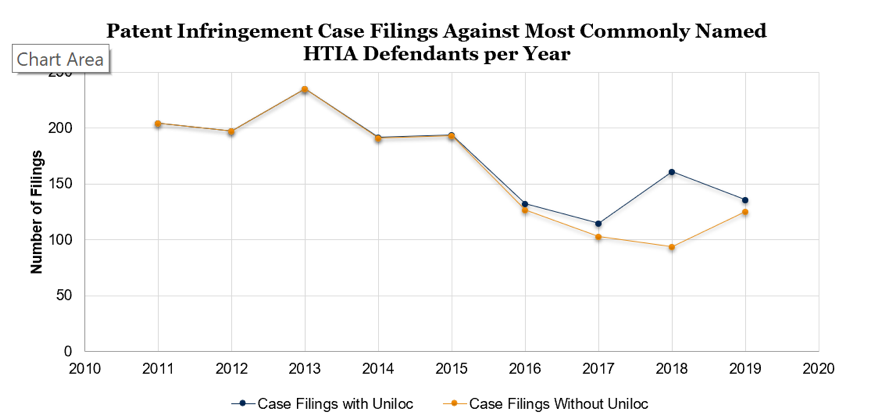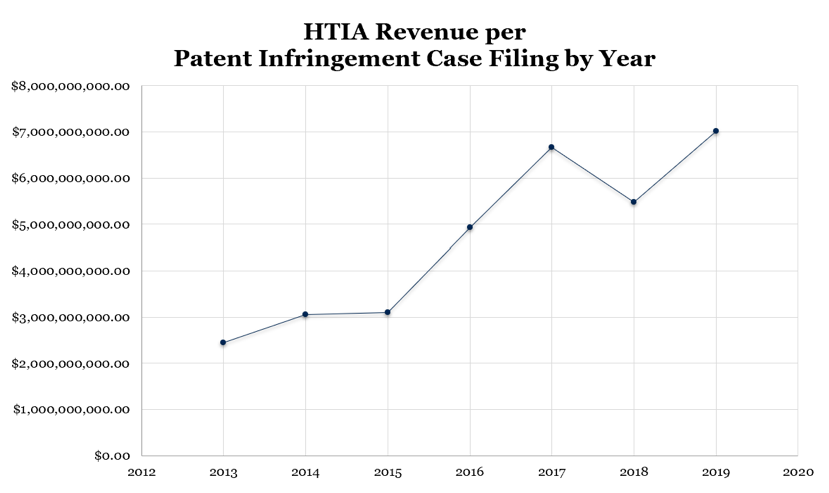“Big Tech companies are not now—nor were they ever—the victims of a massive wave of patent lawsuits, either before or after the Alice-Mayo inquiry was created by the Supreme Court. This is a policy canard.”
 A year ago, the Senate held three days of hearings with 45 witnesses on a legislative proposal that would have brought much-needed reform of 35 U.S.C. § 101. These extensive hearings on patent reform were unprecedented in recent times. They were a strong signal of a commitment by policymakers to abrogate the disastrous and destructive Alice-Mayo inquiry. Senators Thom Tillis (R-NC) and Christopher Coons (D-DE) promised quick action with a bill formally introduced by mid to late summer. A year later, there is no bill and the reform effort has stalled.
A year ago, the Senate held three days of hearings with 45 witnesses on a legislative proposal that would have brought much-needed reform of 35 U.S.C. § 101. These extensive hearings on patent reform were unprecedented in recent times. They were a strong signal of a commitment by policymakers to abrogate the disastrous and destructive Alice-Mayo inquiry. Senators Thom Tillis (R-NC) and Christopher Coons (D-DE) promised quick action with a bill formally introduced by mid to late summer. A year later, there is no bill and the reform effort has stalled.
Silence is Consent
What happened? Notably, Big Tech refused to participate in the hearings. Senator Tillis explained in the second day of hearings that “we invited some of the large, high-tech companies to be present and they decided not to as individual companies and instead be represented by … the High Tech Inventors Alliance, and that’s okay, but … silence is consent. What we want here is people working out of the shadows collaboratively with the bill.” In his opening remarks on the third day of hearings, Senator Tillis stated again that “we did invite Google, Apple, Dell, Microsoft, and Oracle to testify,” and again noted that these companies declined to do so in lieu of a single witness from the High Tech Innovators Alliance (HTIA).
At the hearings, HTIA and other opponents of reform from policy organizations closely linked with HTIA members invoked the tread-worn narrative of abusive patent litigation by patent trolls. They argued they needed the Alice-Mayo inquiry to quickly and efficiently dismiss these patent troll lawsuits to avoid incurring unnecessary litigation expenses.
The patent troll narrative in the patent policy discussions in D.C. has worked well for Big Tech for more than a decade. The patent system has been substantially weakened over the past 15 years with a slew of court decisions, regulatory actions, and legislation that have mostly restricted or eliminated many patent rights. By itself, the Alice-Mayo inquiry has wrought legal uncertainty and unprecedented invalidations of patents or rejections of patent applications. The data confirms a loss of the longstanding competitive advantage of the gold-standard U.S. patent system in promoting innovation relative to Europe and China.
The Real Strategy
The simple fact, though, is that Big Tech is not truly concerned about patent litigation. Yes, there are some bad actors in the patent system, such as the notorious scammer MPHJ, just as there are in any field of law or other human endeavor. But rhetorical epithets and junk science statistics do not prove the patent system is “broken” or that patents impose a “tax” on innovation.
Big Tech’s goal is more strategic: a weakened patent system makes it possible for these companies to engage in what lawyers and policy wonks call “efficient infringement.” Everyone else calls it piracy. Invention theft has become more common because it’s now an easier and cheaper method for large, well-capitalized companies to simply take someone else’s technology than to invest the time, money, and resources in creating it themselves.
Piercing the veil of Big Tech’s self-serving policy rhetoric, the data confirms that they are not suffering from widespread “abusive litigation” by “patent trolls.” Big Tech companies are not now—nor were they ever—the victims of a massive wave of patent lawsuits, either before or after the Alice-Mayo inquiry was created by the Supreme Court. This is a policy canard.
In fact, the litigation trend for HTIA member companies is downward. Since 2010, HTIA companies have experienced approximately a one-half to one-quarter drop in lawsuits filed against them (with a significant number of the recent lawsuits filed by a single company):

One might still argue that approximately 150 patent infringement lawsuits filed per year against a handful of high-tech companies is a tremendous number of lawsuits. But the question is always: By what standard? Or, as economists put the point: As compared to what?
Making Assumptions
First, there’s a denominator problem. It is wrong to assume that all 150 lawsuits filed against HTIA companies are “abusive” (regardless of how this term is defined). Of course, HTIA member companies make this assumption, for obvious economic reasons. Policymakers should not accept Big Tech’s assertion that these are abusive lawsuits filed by patent trolls. When a company says, “Do no evil,” this does not mean it practices what it preaches.
The optimal number of lawsuits in any field of law is not zero. Disputes always occur, and these disputes sometime require resolution by the courts. This is as true today as it was in the 19th century, in which there were many more patent lawsuits by an order of magnitude than today.
Second, HTIA members represent large, multi-national companies with hundreds of billions in revenue, and this makes clear that these lawsuits are statistically insignificant. Normally, all companies see legal disputes increase as their businesses grow, including intellectual property disputes. Not so for HTIA members.
HTIA members have enjoyed phenomenal economic success in the past decade while patent infringement lawsuits have decreased over this same period. HTIA members had a combined market cap of $983,115,560,000 for the 2010 fiscal year (as of December 31, 2010). Their combined market cap increased to $4,142,555,710,000 by the 2019 fiscal year (as of December 31, 2019). This is a whopping 321.4% increase (this excludes Dell, which was a private company for a period from 2013 to 2018). Their combined revenues grew at an equally impressive rate. In 2013, HTIA members had a combined annual revenue of $574,435,112,000 and by 2019, it was $953,776,235,000—a 66.8% increase (again, this excludes Dell). These numbers have only increased during the COVID-19 pandemic, as Big Tech companies have had massive increases in profits if only because demand for uses of their services skyrocketed during the quarantines and shutdowns.
In sum, while patent lawsuits have dropped against Big Tech, their revenues have soared:

During this same time period, according to data from the AIPLA’s annual “Report of the Economic Survey” and from Lex Machina, costs of patent litigation generally have dropped:

Even more important, damages awards on findings of infringements of valid patents have dropped significantly over this same time period (2011-2019), and while there has been a slow rise in recent years, they are still below the levels they were in 2011 or 2012:

In sum, the data paints a very different picture than that portrayed by HTIA member companies in their public statements and lobbying efforts. Instead of a never-ending tsunami of ongoing lawsuits brought by abusive “patent trolls” (defined broadly to encompass any patent owner, including even universities and inventors), HTIA members have experienced a relative low number of total patent lawsuits, with decreasing overall costs and generally lower damages awards. (Data also confirms a significant drop in awards of injunctions for many patent owners, including for both manufacturers and licensors.) Concurrently, HTIA member companies have benefited from massive increases in both revenue and market capitalization.
Why then are HTIA member companies opposing reform of Section 101?
The Sonos Example
The answer to this question is found in the answer to the question, “Who benefits from a weakened patent system?” Sonos can answer this question. The innovative startup pioneered wireless speaker technology in 2005. In 2013, Sonos entered into a commercial relationship with Google and Google gained access to Sonos’ proprietary technology. Sonos then spent the ensuing years continually requesting that Google respect its intellectual property rights, especially after Google began competing with Sonos by selling its own wireless speakers, which incorporated Sonos’ technology and which were sold at lower prices than Sonos speakers. For years, Sonos insisted that Google enter into a license to use its technology. Instead, Google held out and refused to do so. After years of negotiations and increasingly aggressive holdout behavior by Google, Sonos filed a patent infringement lawsuit against Google in early 2020.
The outlook for Sonos is grim. It will have to navigate years of litigation in which Google has a veritable arsenal of legal opportunities to invalidate Sonos’ patents, including the Alice-Mayo inquiry. Even if Sonos succeeds in winning the lawsuit, it faces another uphill battle in receiving its rightful remedies. Joe Nocera, the commentator responsible for popularizing “efficient infringement” with his op-ed, “The Patent Troll Smokescreen,” observed shortly after Sonos filed its lawsuit against Google that, even if Sonos wins its lawsuit, it still loses.
A Labyrinthine Legal Pathway
Many inventors, startups and small business know this story all too well. In recent years, we have all read of prominent cases in which a lucky patent owner initially receives a large damages award against a Big Tech company, such as the University of Wisconsin receiving a $506 million judgment against Apple for the unauthorized use of its patented technologies in the Facetime app. These patent owners watch their initial success evaporate as appellate courts apply the new legal rules and reverse the judgments. After a multi-year legal battle, this is what happened to the University of Wisconsin, which was accused of being a “patent troll” by the supporters of Big Tech. A few patent owners have succeeded in holding Big Tech accountable for invention theft and their refusals to enter into a license, but it takes a decade of running a legal gauntlet in which attorneys’ fees and lost commercial opportunities take their toll.
For many of these patent owners, though, there never is a lawsuit—their attorneys tell them their patents will be invalidated in court or at the Patent Trial and Appeal Board (PTAB). If they are lucky and prevail, they must be willing to pay for a decade of litigation in which deep-pocketed defendants grind them down. They then will receive minimal to non-existent remedies, and even then the remedies will be further challenged on appeal with more opportunities for reversals or reductions in the awards.
In sum, invention theft works because the legal cards, such as the Alice-Mayo inquiry, are stacked against patent owners. Many undercapitalized patent owners—individual inventors, startups, universities, small businesses—are unable to enforce their rights against those deliberately trespassing on their rights. For Big Tech companies who can afford to fund and staff their legal departments with $1 billion annual budgets, spending even $17 million in litigation expenses is a rounding error compared to the billions added to their bottom line when they pirate a patented technology.
Removing Big-Tech’s Cloak
Bruce Sewell, former General Counsel for Apple, explained in a talk he gave last year at Columbia Law School at the same time the Senate was holding its Section 101 reform hearings, a $1 billion legal budget made it possible for him to “use risk as a competitive advantage.” He said that Apple CEO Tim Cook told him, “I don’t want you to stop pushing the envelope.” Sewell didn’t talk explicitly about patent litigation, but this was clearly part of this legal strategy. Apple is notorious for playing legal hardball with business partners, competitors, and litigation opponents in patent cases.
Patent owners are often accused of acting for their own immediate economic interests when they petition Congress for much-needed patent reform, such as addressing the legal and policy disaster of the Alice-Mayo inquiry. In opposing this reform, Big Tech companies have wrapped themselves in the cloak of innovation and freedom to operate—made safe by the Alice-Mayo inquiry from unremitting abusive patent litigation. It is time to distinguish Big Tech’s self-serving policy rhetoric from the economic reality of its self-serving lobbying efforts.
Note: This essay was updated on August 7 to revise the market cap numbers of the HTIA member companies and percentage increases.

![[IPWatchdog Logo]](https://ipwatchdog.com/wp-content/themes/IPWatchdog%20-%202023/assets/images/temp/logo-small@2x.png)

![[Advertisement]](https://ipwatchdog.com/wp-content/uploads/2024/04/Patent-Litigation-Masters-2024-sidebar-early-bird-ends-Apr-21-last-chance-700x500-1.jpg)

![[Advertisement]](https://ipwatchdog.com/wp-content/uploads/2021/12/WEBINAR-336-x-280-px.png)
![[Advertisement]](https://ipwatchdog.com/wp-content/uploads/2021/12/2021-Patent-Practice-on-Demand-recorded-Feb-2021-336-x-280.jpg)
![[Advertisement]](https://ipwatchdog.com/wp-content/uploads/2021/12/Ad-4-The-Invent-Patent-System™.png)







Join the Discussion
17 comments so far.
Anon
June 30, 2020 12:33 pmJam,
Unfortunately, your post hits the mark only too well.
We very much have a ‘capture’ of the one branch of the government who has the responsibility for providing patent law.
Jam
June 29, 2020 07:26 pmSo long as the anti-patent forces outspend the pro-patent forces on campaign contributions and lobbying, very little will change.
Pro Say
June 28, 2020 09:03 pmBig +1 Eric.
We inventors must never give up this good fight.
Never.
Eric
June 26, 2020 06:41 pmThis whole charade now matters very little to most of the ‘real-world’ inventors, who have already left the scene. This “Section 101” show-hearing farce, is hardly anything more than playing to the future historians, to begin to ‘write history for the victors’, in advance of a final societal acknowledgement that they’ve won.
U.S. of A.? No.
U.S.E.I (!)
The United States of Efficient Infringers.
As A New Pocket History of the United States* makes clear, “For so much of the U.S. Congress’ concerns and efforts in the years 2008 to 2024 was devoted to an enormous effort to curtail and thwart the Patent Trolls Formerly Known As Inventors. This sacred endeavor was finally declared a rousing success by about the year 2025.” (p. 374) (…a caricature, lest there be any doubt)
As certain members of so-called Gen-Y put it, “relax and embrace the suck” (also famous for “OK Boomer”).
U.S. Inventors were never accorded the slightest respect by the Patent Pirate Party whose guests included
– ‘Big Pharma’,
– ‘Big Auto’,
– ‘Big Tech’,
– ‘Big Banking’ and
– ‘Big Law’;
– the U.S. House of Representatives,
– the CAFC,
– the U.S. Senate,
– large swaths of accredited academia of the United States,
– the Supreme Court of the United States of America,
– a large proportion of the members of AIPLA, and
– the 44th President of the U.S.A.
We Inventors, never stood a chance, to not be destroyed: in our societal standing, our public respectability, our commercial agency; nor, as regards our U.S. Constitutional rights.
The “FIX” was known to be “IN”. And, when ANY given issue is “FIXED” by the ‘insiders’ of a particular ‘Inside-the Beltway’ Power Play, it is usually enough for the ‘Swamp’ creatures of the Beltway to ignore any semblance of elected or appointed responsibility, and look instead to ‘Ok…Where’s My Cut?’.
Obviously, there are many of those who do not agree with the foregoing, who have striven mightily with much more limited resources, to resist these corrupt exploits. And, each and every one of those persons or entities striving to prevent these very harmful outcomes, has my gratitude and admiration; as well as that of almost all inventors and patent owners.
To Fight The Good Fight is no trivial thing.
And, this wouldn’t be the first time in history, that a Good Fight was lost.
Meanwhile, the besmirched and publicly disgraced Inventors go censored into the Night….thus presaging the immense regret of future American generations, from whom the judgment of history towards the Gen-Xers, Millenials and Gen-Yer’s; who so enthusiastically supported and cheered on this willful destruction of American Inventors’; will be extremely critical, inexorably derogatory and uniformly unforgiving.
Neil Thomas
June 25, 2020 12:11 pmThe evidence of what eBay, AIA and Alice have done to small innovators is how “contingent fee litigators” have all but vanished from the landscape leaving small inventors “up the creek without a paddle.”
Both the Democrats and Republicans are to blame.
Roger Hahn
June 24, 2020 06:20 pmAgree, but the argument that HTIA members enjoyed phenomenal economic success in the past decade while patent infringement lawsuits have decreased over the same period requires better statistical analysis, because correlation is not causation. To convincingly make the point that HTIA unfairly benefited requires AB testing and randomized studies between different patent systems, time periods, and trends. For example, it’s far from clear whether some other policy or combination of policies/trends are responsible for outsize growth over a 10 year period. A low interest environment existed during that same time, and HTIA companies weren’t the only ones to benefit from a decade of free money. A better way might be to look at long term predictions pre-Alice and compare with actual revenues. Data should also be more granular, so you can attribute to a specific business unit or income streams. For example, Alphabet’s 2019 10K conveniently breaks out revenues into the U.S., EMEA, and APAC regions. However, Samsung, another HTIA, does not. Since most companies will never publish their margins, or break down the data further than what’s required by GAPP, someone needs to back into the data, and then perform the analysis. I think this would be worthy exercise that could help the pro-patent community, because I fundamentally agree that Big Tech has perversely exerted monopoly power over SMEs by playing a damaged system to it’s advantage, in effect turning the intended purpose of patents on it’s head. @RogerHahn
anonymous
June 24, 2020 09:59 amBig Tech is engaged not only in large scale “efficient infringement”, but in a purposeful pattern of willful patent infringement. It is part of Apple’s very business plan. How many times have they been adjudged to have willfully infringed, and yet no change in their unfair business practices? Not even the threat of treble damages alters their conduct. Enhanced damages ought to be the norm for serial willful patent infringers, but instead Congress is turning a blind eye while the courts burn and loot the property of the American inventor.
When Amazon will demonstrate such lack of candor in testifying before Congress, what level of respect do you think they’ll show small companies and individual patent owners and inventors?
It is time for the American inventor and Congress to stand together against the abuses of Big Tech. Keep up the good work, Professor Mossoff. You speak for a lot of us who need their voices heard and their concerns acted upon.
Anon2
June 24, 2020 08:55 amJacek @7
MONEY is the root of all GOOD, when exchanged between voluntary traders in a free market…
BRIBERY of people in government whose proper role is to uphold the constitution and to protect individual rights, IS a pernicious evil… but to make THIS possible, the potential bribers must believe that government CAN be bribed… so it must also be true that somehow people of deficient INTEGRITY come to people the roles of government… and for the public to know it.
Government Corruption, Corporate Welfare Statism, Crony Socialism… these are some of the greatest ills in the mixed economy Constitutional Republic which is America.
Pro Say
June 23, 2020 07:19 pmp.s. And a big thanks for a superb analysis Adam.
You know of what you speak.
Now if only you were a Senator or Congressman . . .
Congress: Please do what’s good for our Country; not what’s good for Big Tech and other bad actors.
Anon
June 23, 2020 01:01 pmJan Van Hooey,
And what of that? Are you saying (by implication) that since individuals in almost all instances can afford lawsuits even less, that NO lawsuit should be allowed against individuals?
I think that you MAY have a point – but that point would require a different focus and would be applicable to civil procedure reform rather than any modification of innovation protection.
jacek
June 23, 2020 10:53 amThe fundamental question is why we are facing this state of affairs.
It comes down to members of Congress involved in pay to play system, unwilling to do the right thing. Same situation as with the Rifle Association.
The Senate hearing is just for show.
They will never stop beating around the bush.
The only way to change things is to stop the money flow – corruption.
They represent the foreign interest, in this case, a multinational corporation with no allegiance to anything but MONEY and, by extension, China.
Night Writer
June 23, 2020 07:46 amThe last time an objective study was done by the government was back in 2006 I think by the OMB that said there was no troll problem and no patent litigation problem. Obama quickly remedied what they said.
MaxDrei
June 23, 2020 04:52 amWe should try to keep things simple. In what follows, keep in mind the word “cartel”.
Large corporations are inherently psychopathic. The only thing that matters to them is that their share price shall rise. Everything human that gets in the way of that objective has to be got rid of, by whatever means are available. Society decides what means are made available to the corporations. Where there is a will, there is a way to do it. It’s been done before, in the USA. It can be done again.
Back in the day when large scale patent litigation was the preserve of Big Pharma, there were no patent cartels. But with the centrality of “standards-essential” patents, things are different now. Each Big Tech operator has grown used to trading their s-e portfolio with the others in the group. It’s second nature to them, these days, just an ordinary way of doing business. For the cartel, patent litigation is a threat that is easy to manage downwards.
A conspiracy of psychopaths, working against the interests of the general public, is not a good look.
Trouble is, you can see such a conspiracy everywhere you look, at least in the BRICS States, whether it be Putin-blessed plutocrats in Russia or privileged members of the CP’s innermost circle in China.
Will COVID-19 help or hinder a break-out? Too early to say, I suppose.
Jan Van Hoey
June 23, 2020 03:09 amSmall software companies cannot afford litigation.
Ternary
June 22, 2020 08:45 pmExcellent analysis. Hello Sen. Tillis, Sen. Coons, still awake or merely practicing crocodile tears on behalf of Big Tech?
Anon
June 22, 2020 08:13 pmCould it BE made any more clear?
Thank you.
Pro Say
June 22, 2020 07:38 pmSince Alice, the Federal Circuit has been the proverbial bull in a china shop – improperly obliterating innovation left and right whenever it detects even a whiff of abstractness.
SCOTUS birthed the bull.
The unconstitutional bull.